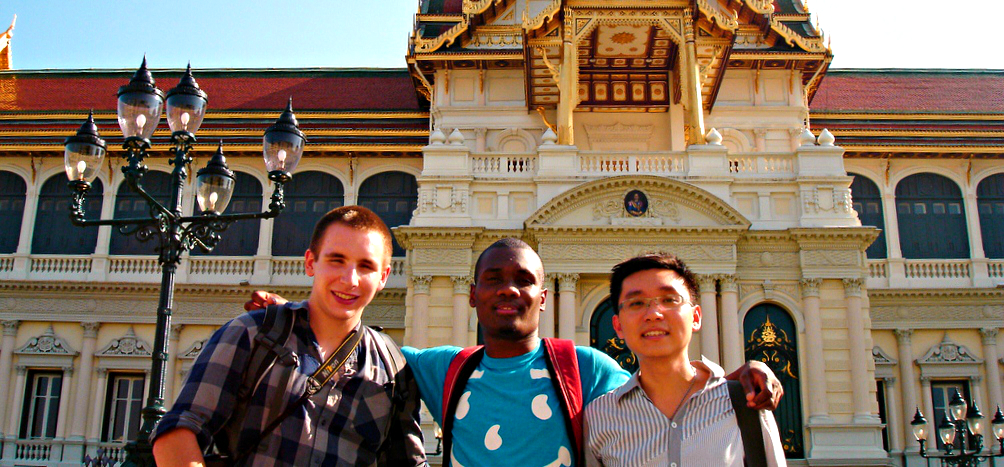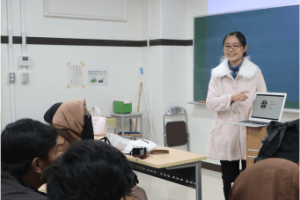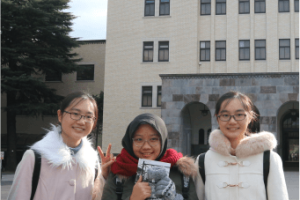
Why study in Thailand?
Open-minded students get here the biggest benefits for their money
am Ulrich Werner, the author of this Web site. I teach in international programs at Thai universities since 2002, and meanwhile more than 10,000 students attended my courses. Among them, there were approximately 4,000 foreign students from all over the world. With this Web site, a Guide to Study in Thailand in mind, we certainly often talked about how it is to study here.
I mention this because this page should not be the usual tourism advertising. You will understand why we (i.e., my students, my colleagues and me) are convinced that open-minded students get in Thailand the highest value for their money worldwide.
Let me begin with some obvious reasons.
Thailand as a holiday destination
Millions of tourists come each year for the weather, the beaches, the culture, the food, and the shopping opportunities. Many of them are regular visitors who spend their holidays here for years. Still, in each holiday they experience something. This country is so multi-facetted that it’s impossible to explore it in-depth in one or two three-week holiday periods. Many tourists would love to stay here for a year or longer and indulge into the every-day life in Thailand, as opposed to the tourist environment that feels a little artificial over time.
The people of Thailand
One of the biggest attractions of Thailand are its people and the incredibly kind way they treat each other. There is a reason why Thailand is called ‘The Land of Smiles’ – you see smiling people everywhere. Ask somebody on the street for direction, and you are greeted with a wonderfully warm smile.
Buddhism left its traces in Thai behavior, although it is today much like it is with Christian churches in western countries – people are not the strongest believers. Often you see in temples the youngest and the oldest, while the others go on doing their jobs.
The majority of Thais are Buddhists, with large goups of Muslims, Hindus, Sikhs, and Christians also in the population. Buddhists don’t know fanaticism, what contributes to the great atmosphere as well. The King supports all religions practiced in Thailand, and thus continues a long tradition of religious tolerance in Thailand. Despite the high speed of development, Buddhist values of moderation and tolerance continue to be of high infuence on the Thai people, which includes the young people.
Overall, Thai people really love their country and believe it’s the best place to be on this planet. This love is it why they try to have you a most pleasant time in their country. Thai hospitality is just great, where ever you are in this country, and in any situation.
The food of Thailand
For a potential student, the probably most important information is that great food is very affordable all over the country. In a university canteen, you won’t pay more for a lunch than 30 or 40 Baht (i.e., 0.90 to 1.20 USD or 0.80 to 1.00 Euro, respectively). For a double of that, you get a meal in the myriad of street restaurants all over the country, together with a bottle of Coke or Pepsi.
Thai food is world famous. The culinary influences of India, China and Malaysia lead to a unique Thai cuisine that always allows you to spice it up yourself at the table if you like it hot. You smell the food stalls everywhere in Thailand, and it really does not stink – it’s mouthwatering.
Culture and getting around
Thailand has 77 provinces, covering everything from near-desert to mountainous regions, a wide variety of beaches and numerous islands in both the Andaman Sea and the Gulf of Bangkok, and settlements from sleepy jungle villages up to the 14-million metropolis Bangkok, and anything in-between, and all that with plenty of historical sites to visit.
There are about 68 million people in Thailand. Certainly, there is an ‘official Thai culture’ that is often practiced in ‘official settings’ in Bangkok, but when you move across the country, you will find many more different cultures. In the north-east of Thailand, called the Isan or Esaan region, people speak a mix of Thai and Lao language. These people are very easy to get in touch with – as soon as they see a new face, they want to talk to you. Most can’t speak English, but body language can be very helpful, and it’s always with a great and warm smile. You will be surprised how well you get along only by body language and smile in this interesting country.
There are many spots of very different cultures in Thailand, too. The Arab quarter in Bangkok, or Chinatown, or the Indian quarter, and many others – they allow you to learn about the world without leaving Thailand for a day.
Getting around the country or town is not difficult. Public transport services are everywhere, from long-haul cross-country buses down to the motorbike taxi that brings you from the bus stop to your apartment building. Famous in Bangkok are also the water bus routes on the multitude of canals that flow through the city and once gave it the name ‘Venice of the East’.
It may be tricky at first to understand the different modes of transportation, but you can be sure that your Thai fellow students will be eager to teach you. They want you to feel good in their wonderful country.
Thai universities
Only some Thai universities offer international programs, currently we have almost 50 universities listed on this site. Some programs are more international, some less so. Well, they all use American college textbooks, but if all students are Thai, and the lecturer is Thai … how likely is it that they permanently speak English in class?
Some international programs, in contrast, have a high percentage of foreign (mainly western) lecturers, and up to about 50 percent foreign students in all their courses. That is where you should go.
The networking effects
We all know that most of what we learn does not come from teachers. One of the most valuable sources of learning are your fellow students. Imagine you do group work with six fellows from very different parts of the world. Different cultures do things differently, people say, and so will be their input to your group work. A great source of learning that makes you a truly multi-cultural student, and allows for developing your personal international network. That’s one of the biggest long-term benefits.
Value for money
While U.S. American students easily pay up to 80.000 USD or even more for a Bachelor degree program, your cost of study in Thailand is much lower, starting at USD 6.250/€ 5.290 for a full Bachelor degree program, at USD 3.005/€ 2.543 for a Master, and at USD 7.029/€ 5.950 for a full Doctorate degree program.
How multi-cultural would it be if you study in your home country? How many influences from all over the world would you experience there? Compare. Here, you get a really great value for your money.
There’s one more interesting aspect to it. Although it’s true for any study abroad, you will experience how it is to live as a foreigner in a country. In Thailand, that is usually a boring experience since it comes along with waiting times for your visa, for your visa renewal, for your registration, etc. Still, it is a most valuable experience once you lead a team of international colleagues – you will understand their problems to maintain stay better than anyone else.
To make the point clear: For us, who live in Thailand (lecturers and students alike, Thais and foreigners alike), the prices for a university degree program in many western countries just look crazy. Quality education is a basic human right, not a piece of luxury that one should buy for many thousand dollars a credit.
Cost of living
In some western countries like Germany, cost of university study is free. Well, but you have to pay for your living, and the cost of living in a western country may well be higher than the combined cost of living and study in Thailand. A standard student room cost around USD 150/€ 127 per month plus cost of electricity and water. For that, you have one room plus your own bathroom, all usually equipped with high-speed Internet and cable TV.
Finally: A word of caution
In the second paragraph of this page, I said “that open-minded students get in Thailand the highest value for their money worldwide”. Please note: Open-minded students.
Once in a while, we meet a student who does not understand that Thais do it their own way, and why they don’t copy the way things are done in this student’s home country. He feels it all annoying and backward, just a developing country.
If you are such a person, you better stay at home. Thailand is a great place to those open to new inputs in any respect, from food over culture to academics and personal friendships. These are the people who will gain the most from studying here, and to be honest, these are the people I have most fun to work with. And so do my colleagues.
Come to Thailand, whatever your age, race, gender, religion and other features may be. You will be welcome, and you will feel welcome!
Your
Ulrich Werner


